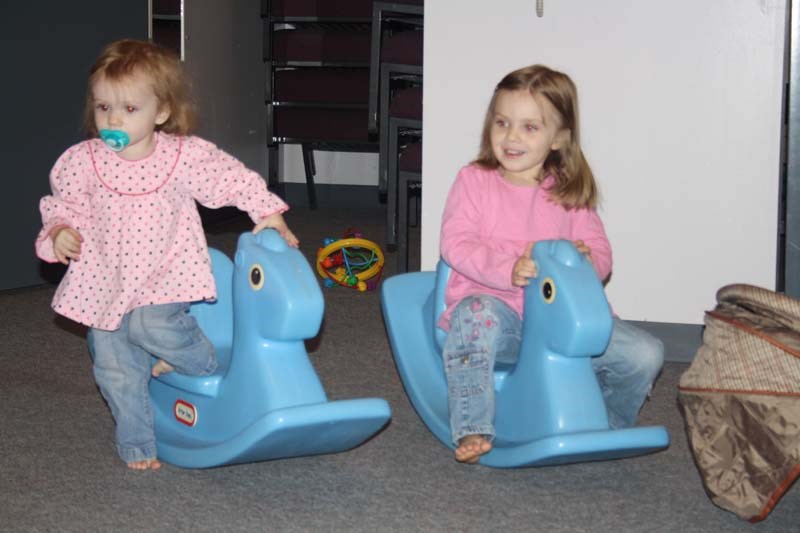Summer camp season has ended, and with older kids back in school, it's time for Thompson's preschools, daycares, and playgroups to step in for those not quite ready for the real thing.
One program that's new for 2010-11 is Sprouts, a no-cost playgroup held at the Thompson Pentecostal Assembly on Goldeye Crescent every Thursday, with two drop-in sessions - one from 10 a.m. until noon, and an afternoon session from 1 p.m. to 3 p.m.. Sprouts held its grand opening Sept. 2.
"People with young children are looking for a place to go and play and visit with other parents," explained Sprouts coordinator Theresa Peters. "It'll be a little different from other playgroups, because it's partially structured and also we're basing it on principles of early literacy and play-based learning. We want to encourage those kinds of activities. We believe that families are important and parent involvement with children is important."
Although the group does meet at a church, Peters stresses that Sprouts is not a faith-based initiative. "It's not a religious teaching time," she said. "It's just a way for the church to contribute to the community. The church is supporting it, but it is definitely open for everyone. You don't have to attend church to come, you just have to have a kid to bring."
Sprouts is geared towards a five-and-under age group, but that's because older kids will be in school while it's running, and Peters says that kids of any age are welcome. "Normally anyone older is in school," she said, "but we home-school and my son is seven, so he'll be there." Peters says that there will likely be some sort of summer program as well, though plans for that have yet to be finalized.
"We saw a need in the community, and a need in our church," said Peters about the inspiration for Sprouts. "There are some very young families in our church. It's a good way for the church to be a part of the community, an option for families, and being known as a church that's helping and caring for people."
"When they first arrive, they'll just play for a while," explained Peters, who has taught Kindermusik for the past four years. "Then there will always be an activity - one week it will be movement and music, another week it will be crafts, or Play-Doh, or baking. My passion is to see families playing together and learning together and to be able to teach parents about theemotional and developmental benefits of playing and reading with their children."
"I'm surprised how quickly the news spread," admitted Peters. Over a dozen parents brought their kids to the inaugural morning session. Class size is not a problem for Sprouts, she explained - parents have to stay with their kids, so there's no worries about too many kids for the staff to handle, while if they outgrow their current home in the church foyer, they can move to the basement.
Each session of Sprouts will include a healthy snack, as a healthy lifestyle is one of the core foundations of the group - the others being early literacy, the importance of family, and play-based learning.
Peters explained the philosophy behind the play-based learning approach by saying "play-based learning means that a child's job is to play, and that the best way for them to learn is through play. Music and movement is a really good example of that. Studies show that when children are moving, their brain is more active. The more connections you're making at any given time, the more likely you are to remember what you are doing - so when you're making connections all over your brain at the same time, then you're learning more quickly. It doesn't work so well with adults, but with children, when they're moving, somehow that movement helps their brain to remember."
"We do songs and finger plays, large and small motor activities, building with blocks, pretend games, those sorts of things. It helps them develop their skills. Children who are involved in imaginative play and unstructured play are more likely to succeed in school, more likely to be early readers."




